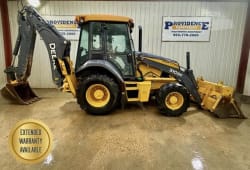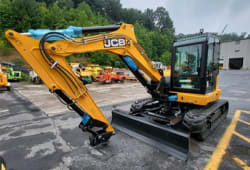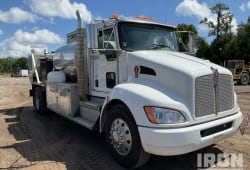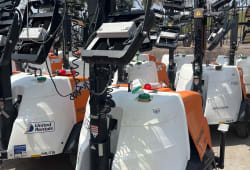Simplifying Transactions with Heavy Equipment Brokers: Buyer's Guide
13 Min read
)
August 12, 2023
In the world of heavy equipment transactions, buyers often find themselves faced with complex challenges. The process of purchasing heavy equipment involves numerous steps, such as understanding the role of heavy equipment brokers, navigating negotiations, and conducting thorough inspections. To simplify this process, many buyers turn to the expertise of heavy equipment brokers, who serve as intermediaries between buyers and sellers. In this buyer's guide, we will explore the advantages of using a broker, discuss potential pitfalls, offer tips for choosing the right broker, and provide a comprehensive overview of the entire transaction process. By the end of this article, you will be equipped with the knowledge needed to make informed decisions and streamline your heavy equipment purchase.
Understanding the Role of Heavy Equipment Brokers
Before diving into the benefits of using a broker, it's important to first understand what a heavy equipment broker is and how they can assist you in your purchase. A heavy equipment broker acts as a middleman between buyers and sellers, connecting those in need of heavy equipment with those looking to sell it.
When it comes to purchasing heavy equipment, the process can often be overwhelming and time-consuming. With so many options available on the market, finding the right equipment that meets your specific needs can be a daunting task. This is where a heavy equipment broker comes in.
What is a Heavy Equipment Broker?
A heavy equipment broker is a professional who has extensive knowledge and experience in the heavy equipment industry. They have spent years building relationships with sellers and manufacturers, allowing them to have access to a wide range of equipment options.
These brokers understand the intricacies of heavy equipment, including the different types, models, and brands available. They stay up-to-date with the latest industry trends and technological advancements, ensuring that they can provide you with accurate and relevant information.
Furthermore, heavy equipment brokers have a deep understanding of the market value of different equipment. They can assess the condition, age, and overall worth of machinery, helping you make informed decisions and negotiate fair prices.
Why Use a Heavy Equipment Broker?
Using a heavy equipment broker offers several advantages. First and foremost, brokers have access to a wider market of equipment inventory, increasing the chances of finding exactly what you're looking for. Whether you need a bulldozer, excavator, or crane, brokers can tap into their extensive network to locate the perfect piece of equipment.
Moreover, heavy equipment brokers can save you valuable time and effort. Instead of spending hours searching through classified ads, and online listings, and contacting individual sellers, brokers can streamline the process for you. They will listen to your requirements, preferences, and budget, and then present you with a curated selection of options that match your criteria.
Another key advantage of using a broker is the guidance and support they provide throughout the entire transaction process. From negotiating prices to conducting inspections and handling paperwork, brokers are there to ensure that your interests are protected. They have a thorough understanding of the legal and financial aspects of heavy equipment sales, preventing you from making costly mistakes.
Furthermore, heavy equipment brokers can offer valuable insights and recommendations based on their industry expertise. They can advise you on the best brands and models for your specific needs, taking into account factors such as durability, performance, and resale value.
In conclusion, heavy equipment brokers play a crucial role in simplifying the process of purchasing heavy equipment. With their extensive knowledge, wide network, and commitment to client satisfaction, they can help you find the perfect equipment while saving you time, effort, and money.
The Process of Buying Through a Broker
Now that you understand the role of a heavy equipment broker, let's dive into the step-by-step process of buying through a broker.
Initial Consultation and Needs Assessment
The first step in purchasing heavy equipment through a broker is the initial consultation and needs assessment. During this stage, the broker will gather information about your specific requirements, such as the type of equipment you need, your budget, and any other specifications.
This initial consultation is crucial as it allows the broker to understand your unique needs and preferences. They will take the time to listen to your requirements and ask relevant questions to ensure they have a comprehensive understanding of what you are looking for. This attention to detail is essential in finding the perfect equipment that meets your specific needs.
The needs assessment process may also involve discussing your long-term goals and plans for the equipment. This information helps the broker not only find the right equipment for your immediate needs but also consider any future requirements you may have.
Equipment Sourcing and Inspection
Once the broker has a clear understanding of your needs, they will begin sourcing equipment from their network of sellers. Brokers often have access to a wide range of equipment options, increasing the likelihood of finding the perfect match for your requirements.
The equipment sourcing process involves the broker leveraging their extensive network of contacts in the industry. They will reach out to various sellers, manufacturers, and dealers to locate the equipment that aligns with your needs. This network allows them to tap into a vast pool of available options, including both new and used equipment.
After identifying potential equipment options, the broker will conduct thorough inspections to ensure their quality and functionality. This step is crucial in guaranteeing that the equipment meets your standards and is in good working condition. The broker will carefully examine the equipment, checking for any signs of wear and tear, mechanical issues, or other potential problems that may affect its performance.
In some cases, the broker may even arrange for independent third-party inspections to provide an unbiased assessment of the equipment's condition. This additional level of scrutiny ensures that you can make an informed decision based on accurate information about the equipment's quality.
Negotiating and Finalizing the Deal
After the broker has identified suitable equipment, they will enter into negotiations with the seller on your behalf. This includes discussing pricing, terms, and conditions.
The negotiation process can be complex, and the broker's expertise comes into play here. They will use their knowledge of the market, industry trends, and their understanding of your requirements to negotiate the best possible deal for you. The broker will work closely with you, keeping you informed of the progress and seeking your input throughout the negotiation process.
Once an agreement is reached, the broker will assist in finalizing the deal, ensuring that all necessary documentation and paperwork are in order. This includes drafting and reviewing contracts, coordinating with legal professionals if needed, and ensuring that all parties involved are satisfied with the terms of the agreement.
The broker will also guide you through the payment process, ensuring that it is done securely and efficiently. They will handle any necessary financial transactions, making sure that everything complies with industry standards and regulations.
Throughout the entire process, the broker will act as your advocate, working tirelessly to ensure that your interests are protected and that you are getting the best possible outcome. Their expertise and industry knowledge are invaluable in navigating the complexities of buying heavy equipment through a broker.
Advantages of Using a Broker for Heavy Equipment Transactions
Now that you understand the process of buying through a broker, let's explore the advantages of utilizing their services.
Access to a Wider Market
One of the most significant advantages of using a heavy equipment broker is gaining access to a wider market. Brokers often have extensive networks and connections within the industry, allowing them to source equipment from multiple sellers. This increases your chances of finding the right equipment at a competitive price.
Imagine being able to choose from a vast selection of heavy equipment options. With a broker, you can explore various brands, models, and specifications that may not be readily available to you otherwise. This extensive market reach allows you to find the perfect equipment that meets your specific needs and budget.
Furthermore, brokers have their finger on the pulse of the industry. They stay updated on the latest market trends, new equipment releases, and industry developments. This knowledge allows them to provide you with valuable insights and recommendations, ensuring that you make an informed decision when purchasing heavy equipment.
Expertise and Experience
Heavy equipment brokers are industry professionals who possess deep expertise and experience. They understand the intricacies of the heavy equipment market and have a comprehensive understanding of pricing, equipment specifications, and market trends. This knowledge helps them guide you in making informed decisions and ensures that your transaction is both fair and advantageous.
When you work with a broker, you gain access to their wealth of knowledge and experience. They can offer you valuable advice on the best equipment options for your specific requirements. Whether you need heavy machinery for construction, mining, or agriculture, a broker can steer you in the right direction and help you avoid costly mistakes.
Additionally, brokers have established relationships with equipment manufacturers, dealers, and sellers. This network allows them to negotiate better deals on your behalf, leveraging their industry connections and expertise. By tapping into these resources, you can secure competitive prices and favorable terms, ultimately saving you money in the long run.
Time and Cost Efficiency
By utilizing the services of a broker, you can save significant time and effort. Brokers handle all the legwork involved in finding and evaluating equipment, allowing you to focus on other aspects of your business.
Instead of spending countless hours researching equipment options, reaching out to sellers, and arranging inspections, a broker can streamline the entire process for you. They have the necessary resources and tools to quickly identify suitable equipment, verify its condition, and negotiate the terms of the transaction.
Moreover, brokers are skilled negotiators, ensuring that you get the best possible deal on your purchase. They have experience in price haggling and can use their expertise to secure favorable pricing and favorable contract terms. With a broker by your side, you can rest assured that you are getting the most value for your money.
In conclusion, utilizing a heavy equipment broker offers numerous advantages. From gaining access to a wider market and tapping into their expertise and experience to saving time and money, a broker can be a valuable asset in your heavy equipment transactions. So, consider partnering with a reputable broker to simplify the buying process and maximize the benefits of your heavy equipment investment.
Potential Pitfalls and How to Avoid Them
While using a broker can simplify the heavy equipment buying process, it's important to be aware of potential pitfalls and take steps to avoid them.
Buying heavy equipment is a significant investment, and it's essential to approach the process with caution and diligence. Here are some common pitfalls to watch out for and strategies to avoid them:
Overpriced Equipment
One common pitfall is purchasing overpriced equipment. To avoid this, do your research and ensure that you have a clear understanding of the fair market value of the equipment you are looking to purchase. Take into account factors such as the age, condition, and demand for the equipment. It's also helpful to compare prices from different sellers and brokers to get a better sense of the market range.
Additionally, rely on your broker's expertise to guide pricing negotiations. A reputable broker will have extensive knowledge of the industry and market trends, allowing them to help you secure a fair deal. Don't hesitate to ask your broker for their insights and advice on pricing.
Inadequate Inspection and Due Diligence
Another potential pitfall is failing to conduct thorough inspections and due diligence. While brokers often handle the inspection process, it's crucial to be proactive and conduct your research as well.
Start by requesting detailed information about the equipment's history, including any previous repairs or accidents. If possible, ask for maintenance records to get a better understanding of how well the equipment has been maintained over time.
When it comes to physical inspections, rely on your broker's expertise but also take the time to personally inspect the equipment. Pay close attention to any signs of wear and tear, potential mechanical issues, and overall condition. If you are not well-versed in heavy equipment, consider hiring an independent inspector to provide an unbiased assessment.
Understanding the history and condition of the equipment will help you make an informed decision and avoid costly surprises down the road. Remember, it's better to be thorough in your inspections and due diligence than to rush into a purchase and regret it later.
Unreliable Brokers
Not all brokers are created equal, and working with an unreliable broker can result in a negative buying experience. To ensure you select the right broker, conduct thorough research, read reviews, and ask for references.
Start by researching reputable brokers in your area or industry. Look for brokers with a proven track record of successful transactions and satisfied clients. Online reviews and testimonials can provide valuable insights into a broker's reputation and reliability.
Don't hesitate to interview potential brokers and ask them detailed questions to gauge their knowledge and professionalism. Inquire about their experience in the heavy equipment industry, their network of sellers, and their approach to finding the best deals for their clients. A reliable broker will be transparent, responsive, and willing to address any concerns or questions you may have.
Additionally, ask for references from past clients who have worked with the broker. Contact these references and ask about their experience, the broker's communication style, and whether they would recommend working with them.
By conducting thorough research and due diligence, you can minimize the risk of working with an unreliable broker and ensure a smoother buying process.
Choosing the Right Broker for Your Needs
Now that you understand the potential pitfalls, let's explore how to choose the right broker for your specific needs.
Factors to Consider When Selecting a Broker
When selecting a broker, consider factors such as their industry experience, reputation, network size, and specialization. A broker with experience in the specific type of equipment you are seeking will be better equipped to understand your needs and deliver results.
Questions to Ask Potential Brokers
During the selection process, don't hesitate to ask potential brokers questions to assess their suitability. Inquire about their track record, the size of their network, their inspection process, and their approach to negotiations. These questions will provide insight into their capabilities and help you make an informed decision.
Conclusion: Simplifying Your Heavy Equipment Purchase
In conclusion, using a heavy equipment broker can greatly simplify the transaction process. They offer access to a wider market, bring expertise and experience to the table, and save you valuable time and effort. However, it's important to be aware of potential pitfalls and take steps to avoid them. By choosing the right broker, conducting thorough inspections, and conducting due diligence, you can ensure a smooth and successful heavy equipment purchase. Remember to leverage the expertise of a broker, ask the right questions, and stay informed throughout the process. With these tools at your disposal, you'll be well on your way to simplifying your heavy equipment purchase.
Recap of the Benefits of Using a Broker
To recap, using a heavy equipment broker offers several benefits:
Access to a wider market of equipment inventory
Expertise and experience in the heavy equipment industry
Time and cost efficiency
Final Thoughts and Tips for a Smooth Transaction
In your pursuit of a smooth heavy equipment transaction, keep the following tips in mind:
- Conduct thorough inspections and due diligence
- Research fair market values
- Choose a reliable and experienced broker
By following these guidelines, you'll be well-prepared to navigate the heavy equipment market with ease and confidence.

Caleb Woods is an experienced content specialist and an editor at Boom & Bucket, blending his journalism background with expertise in the heavy equipment industry. He delivers engaging, informative content to help professionals stay informed and make smarter decisions in the machinery market.













